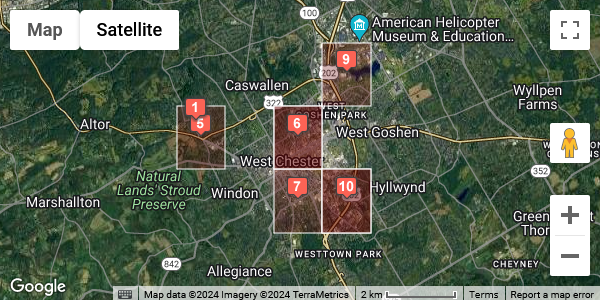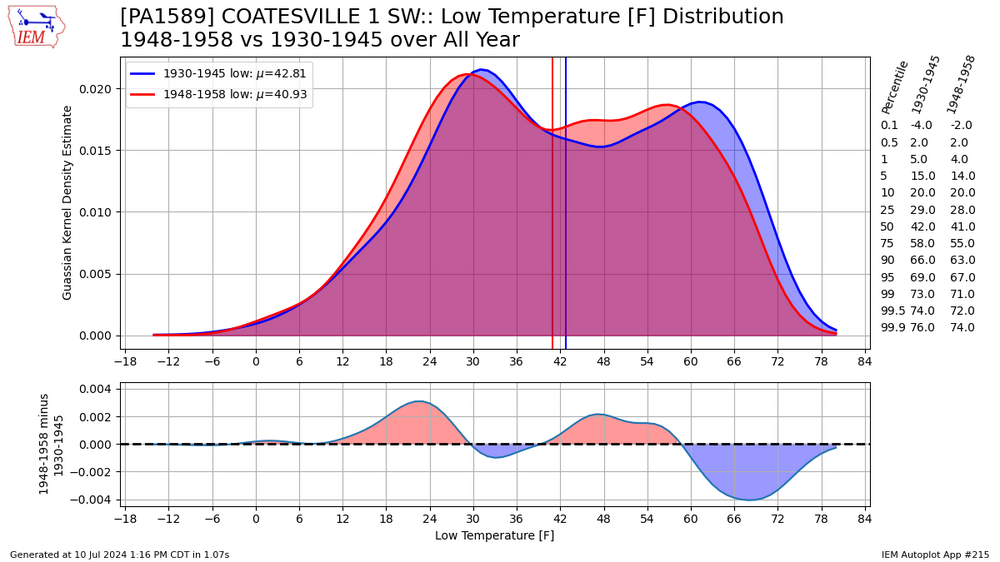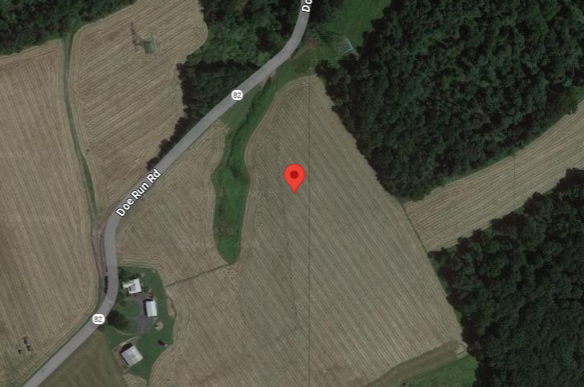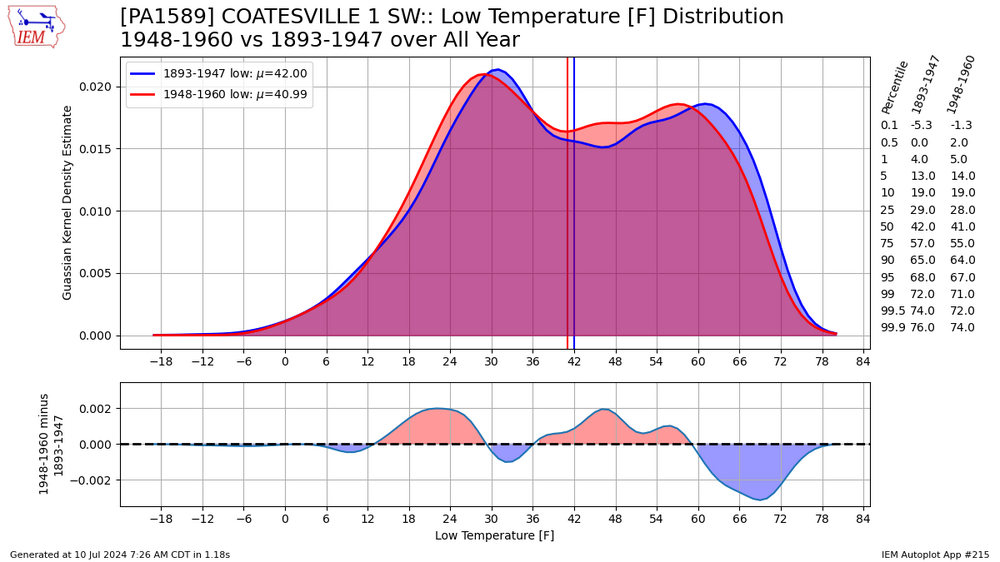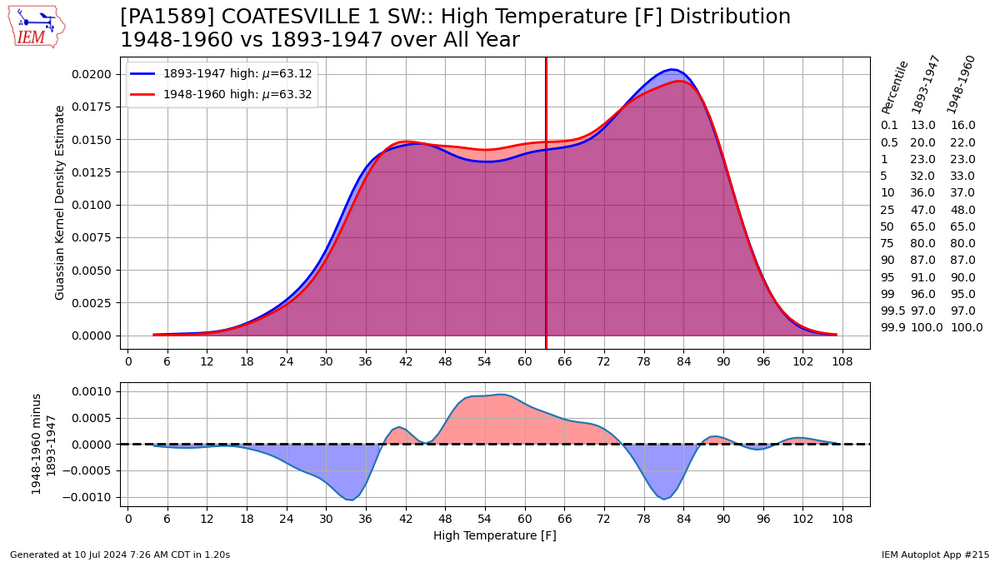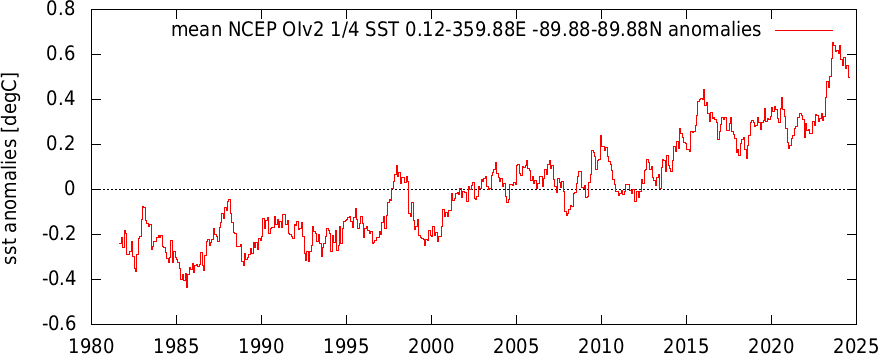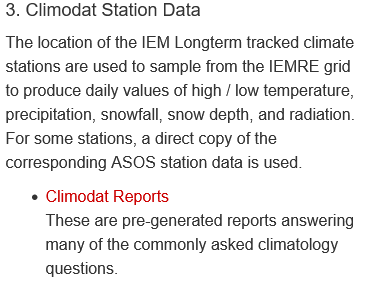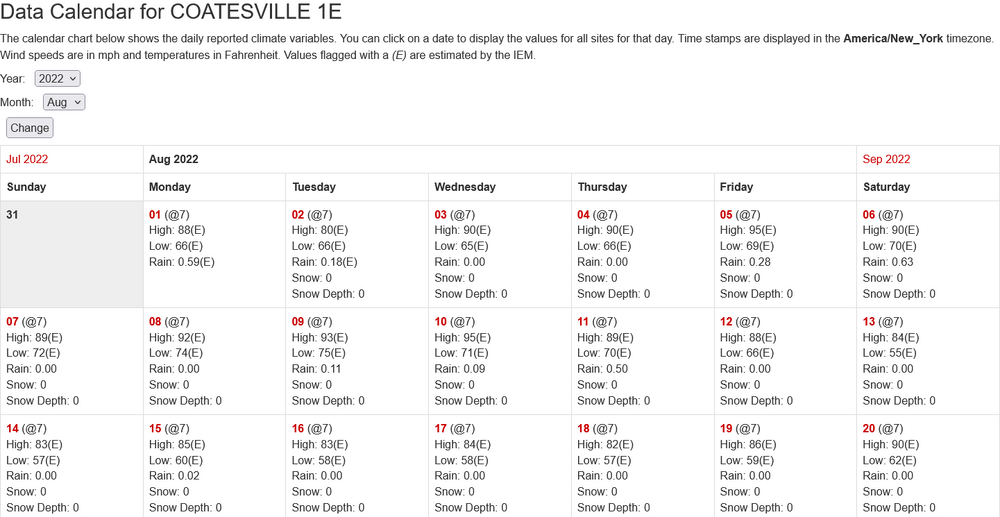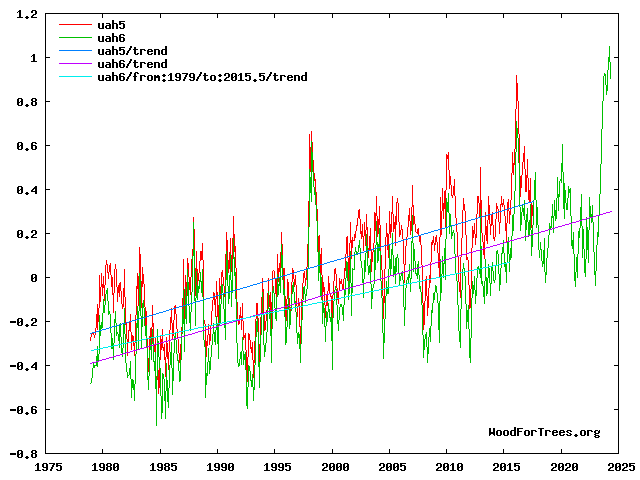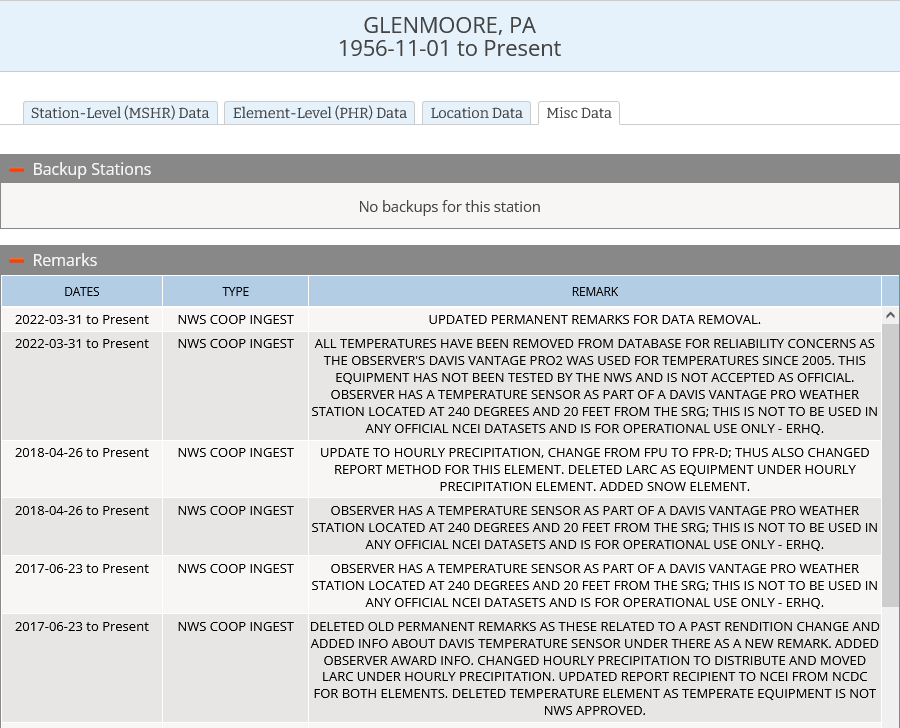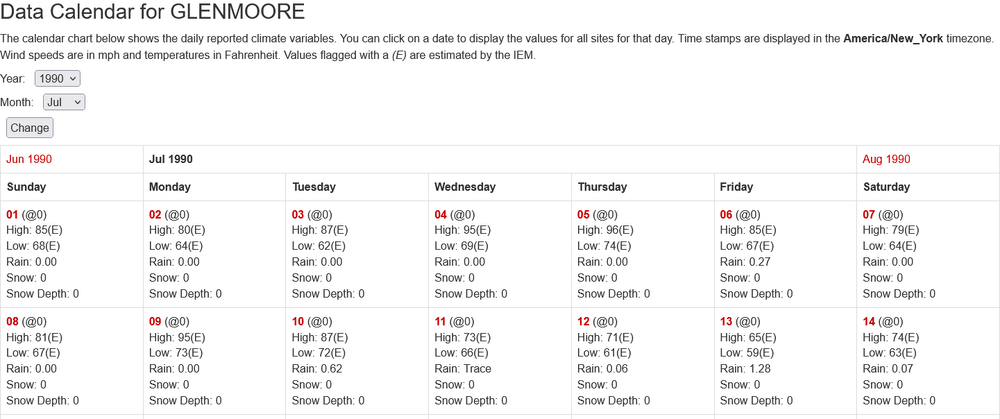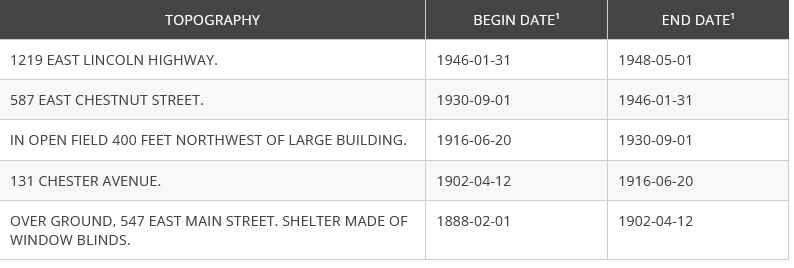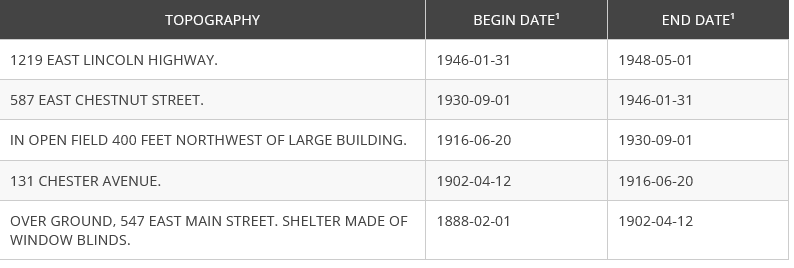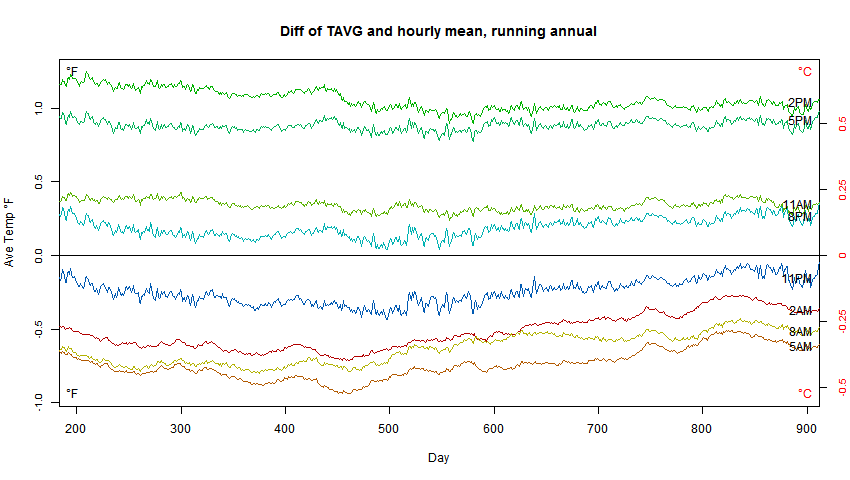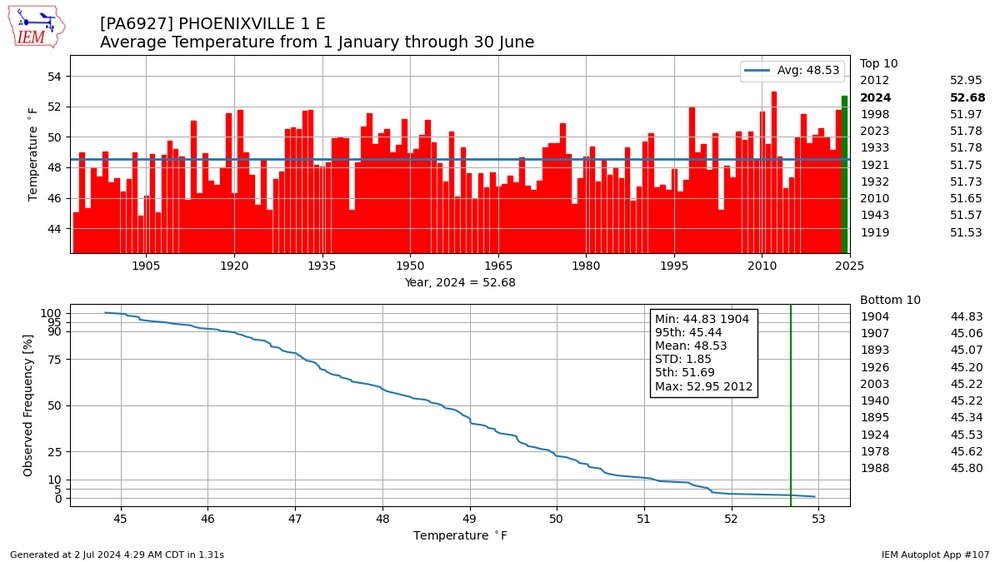
chubbs
Members-
Posts
4,059 -
Joined
-
Last visited
Content Type
Profiles
Blogs
Forums
American Weather
Media Demo
Store
Gallery
Everything posted by chubbs
-
Per NCDC, West Chester also had several station moves. The map and station list below are screenshots from the NCDC site. Unfortunately there are no street addresses and the location information is only approximate. The West Chester station moved within the Borough of West Chester and nearby suburbs. Like Coatesville the last station appears to be the least rural (#1,#5) in a residential neighborhood just outside of town.
-
Thanks for the map. The rest of the response is short on evidence. Lets get into it. First a couple of comments on the map. NCDC shows 6 sites, while you show 5. Perhaps that is why you don't show any site for 1947. Also several of your city locations don't match the street addresses listed by NCDC and posted above. Not sure that the details are that important. The last site from 1948-82 on Doe Run road is clearly more rural than the other sites. “Overall siting looks pretty consistent over a very short distance” No need to guess. Google earth shows the sites are different. We can see the impact of the moves in the observed temperatures. The timing of the moves after the war coincides with temperature changes. “It looks like the “warmest” relative observing site very well might have been the one near the steel mill plant from 1917 to 1930” Again no need to guess. The observations at Coatesville and nearby sites can provide a ranking. . I haven't taken a close look at it yet, except to see that the rural site is noticeably cooler. I've been telling you for years that Coatesville cooled relative to other sites after the war. “Overall all of this Coatesville data observation moves clearly did not have much of an impressive impact on these stations and more importantly on the overall averages for Chester County overall” A meaningless word salad. Its clear that the moves after the war had an impact on measured temperature that would also change your network average. Again you don't have to guess, just compare 1945 and 1948. More importantly the moves within and outside the city of Coatesville reinforce the evidence that has been piling up for weeks. You aren't doing a very good job of estimating Chester County's temperature change through the years. Meanwhile NOAA's bias adjustments are supported by hard evidence of changes at the COOP stations.
-
Not sure your question is relevant. Eyeballing the temperature chart Coatesville and nearby stations there wasn't any cooling in the 1940s that explains the drop at Coatesville, and the drop is mainly due to a change in low temperature. If you isolate the East Main street site by only looking at 1930-45, and, only look at the ten years after the move occurred. The night-time cooling effect is even larger. The results bounce around for other year selections but are always in the same direction. I have also added google earth views of the two sites using location info from NCDC. The sites are very different. Coatesville 1930-1945 Coatesville 1948-82
-
Here's the difference. Coatesville had two moves after the war and ended up in a more rural location. Coatesville temperatures dropped relative to other nearby stations clearly implicating the moves. Not sure why that's so hard for you to accept, you are always telling us important the urban heat island is.
-
Well, your not even close to getting our past climate right. Funny, for a guy who favors raw data you don't show us much. Just your network averages. There's a wealth of information in our raw coop data, that you are missing. For instance at Coatesville, when the station moved to a more rural area in 1948 the nights got cooler but the days stayed about the same. A nice example of the urban heat island effect.
-
The nino put us on the elevator up, and the escalator down. Still too early though to see what floor we are going to end up on.
-
You owe NOAA an apology because you are closer to NOAA now. You are putting lipstick on a pig. Sure DEOS has a nice network. I look at it all the time to check local temps. Doesn't tell us anything about Chester County's past climate though, a poor match to the COOP stations. You seem to have a hard time recognizing that: Phoenixville, the city of Coatesville, and West Chester are warmer than your current network and the county as a whole. If I tried to represent the county by modern stations in those locations you wouldn't be happy. Oh well. Not the only thing you are have trouble recognizing.
-
Nah, just shows how bad you method is. You've made a big change in your estimate Chester County's past climate. The second one you've made this year. Since you won't give us anything beyond a list of stations. I made up a simple chart that shows the station coverage by decade. A bolded capital X is a complete decade. A small x is a partial decade. The monitoring network that you have put together is completely different that the one in 2000. Station changes increased in the 2000s and really ramped in the 2010s. The stations you have added recently, provide very little information on whether Chester County has warmed, because the don't have a long record. In fact the newer stations with longest records: your house and kmqs, match NOAA's warming rate. With the method you are using, all the new stations do is skew the recent decades cooler vs the old network. You aren't accounting for changes in station characteristics. The new stations are higher in elevation, further N and W, and located in parks or other public area i.e., more rural than the older stations. Even when they are close to the location of older stations they aren't a good match. Take West Grove for example. The current station is at the top of the regional landfill well N and W of West Grove. Per your daily reports, the new West Grove station runs as cool as your house on summer afternoons, rarely hitting 90F. For long term-climate purposes we are stuck with a handful of stations. Four stations make up the bulk of the data: Phoenixville, West Chester and Coatesville (2 stations). If you want to look at raw data and argue that it hasn't warmed. Those are the stations you should focus on. The past couple of weeks have only strengthened my conviction that NOAA is spot on. We've found out the Phoenixville was a furnace in the 1930s-1950s, with a poor shelter and time of day bias, much warmer than nearby stations in or out of the county. Coatesville evidently moved from the city of Coatesville to a more rural location in the late 1940s, dropping temperatures by roughly 2F. Bias adjustments for those 2 stations are completely justified and accurate. I've always wondered why Coatesville cooled in the late 40s, now I know. Bottom-line the more we find out about your analysis the worse it looks, complete BS. You owe NOAA an apology.
-
Unfortunately IEM doesn't provide enough warning that the data is estimated. Fooled me until last week. Found this statement on the IEM reanalysis page that provides some info. All the COOP stations are "long-term tracked climate sites".
-
I've had a chuckle over the past couple of pages. As usual you are jumping to the wrong conclusion. The temperatures with an E flag are estimated by IEM. Says so at the top of the data tables. As an example below is Coatesville 1E for the same month. Whenever there is coop station in operation, but without temperature data, IEM dummies in temperatures from their own reanalysis program. Has nothing to do with NOAA or "ghost" stations. Just IEM's attempt to provide a temperature estimate for that COOP location. In any case, there is no temperature data at several of the sites you were using. When you pull the stations, your monitoring network average will change. Hopefully you will issue corrections to all the charts you have posted with a suitable mea culpa.
-
This chart compares UAH6 to the previous version, UAH5. The UAH6 warming rate has increased to almost match the UAH5 rate at roughly 0.15C per decade. When UAH6 first came out in 2015 the initial warming rate was only 0.106 per decade (faint blue line). Quite an acceleration in warming, surprised Roy hasn't mentioned it.
-
Per NCDC, the Glenmoore temperature data was deleted because it didn't meet NWS standards. Looks like the temperature sensor was added in 2009. Honey Brook, Chadds Ford, and West Grove prior to 1963 all get the E flag at IEM. Per NCDC only rain gauges were present. I don't think there was any temperature data at those stations.
-
Below is the the IEM data table for July 1990. IEM flags temp as E for estimated. E flag is explained in header. Can't find any IEM data for Glenmoore that doesn't have an E flag. Same for the other sites I mentioned. Based on what I see at NCDC and IEM don't think there is any temp data for Glenmoore or the other sites with an E flag.
-
No pain at all. You aren't producing any evidence and I am used to your rhetoric. I have a question about the coop data. Researching station histories at NCDC, several coops are shown as having rain gauge data only, no temperature data. Chadds Ford, Glenmoore, and Honey Brook have no temperature data at all. West Grove only has temperature data from 1963 to 1976, rain gauge only before that. I had obtained data for those stations from IEM; but, on checking, the IEM temperature data is flagged as “estimated” in the station data table. Apparently IEM backfills from surrounding stations when coop data is missing. Looks like historic Chester County data is even more limited than we thought. Can you check?
-
Sorry Paul. More data is your hands results in a poorer analysis and a loss of the warming signal. Why? You don't know how to analyze it. More data in NOAA's hands results in a better analysis. NOAA is using much more data than you are.
-
You aren't listening. Averages of an ever-changing network are skewed, doesn't matter how you tweek them..
-
Now that I've found out about the station moves at Coatesville. It is likely that the relative cooling at Coatesville after the war is caused by the station move to a more rural location. Per NCDC, there are two post-war station moves: one in early 1946, and a second move in 1948. After 1948, NOAA matches the Chescowx (two Coatesville stations and East Nantmeal) closely. This is raw coop data from 2 Coatesville stations and Pauls's house in East Nantmeal. All relatively rural after 1948. Before 1948, NOAA matches the bias-adjusted values for Coatesville. Per chart above the Coatesville experienced a city-->rural move related warming that deserves a bias adjustment. As shown a few posts up, Coatesville had more 95 days than Phiadelphia before the move. More strong evidence that NOAA is spot on and Chescowx is way off.
-
I agree completely with your first sentence. We have a much better network today. Better equipment and different locations, not restricted to the warmer parts of the county. But you aren't telling us anything about the climate, only how much the network has changed. You have stacked the deck against warming, by throwing in a lot of cooler stations at the end of the period. Stations with different characteristics than the COOPs, which skews the trend analysis cooler and you still find a warming trend..
-
The list demonstrates that Martz doesn't know what is important (not that we didn't know that). For example It is impossible and unnecessary to determine the average global temperature. Temperatures can vary significantly over short distances. You would need orders of magnitude more thermometers to get a good global average. Fortunately it is much easier to determine the trend in global temperature. As I keep repeating, the year-to-year change in temperature is well correlated over roughly 1000km. Per the paper linked below, you only need roughly 60 stations to get a good estimate of the global trend. There are more than enough weather stations to prove that it is warming globally. Similarly it is impossible to determine the average temperature in Chester County. The historic monitoring network doesn't come close to providing enough coverage. The county is highly variable: cities, suburbs, rural, many types of ag, forests all at varying elevation. Much easier to determine the trend in temperature in Chester County. Since weather data is correlated over 1000 km a large number of stations can provide useful information and it is easy to correct County stations that move or have biased data. As a result the long-term trend in Chesco is very accurately determined by NOAA and other groups even though there are only a handful of long-term county weather stations. https://journals.ametsoc.org/view/journals/clim/7/12/1520-0442_1994_007_1999_satoeo_2_0_co_2.xml
-
Not only is the 1936 record at Phoenixville flawed, Chesco's whole notion that the 1930s summers were warm in Chester County is questionable. Remove Phoenixville and the # of 95F days plummet in 1930s and 40s. Also note the smaller spike in 95F days at Coatesville in the 1890s+1900s. The NCDC station station notes for Coatesville (below) state that window blinds were used as a temperature screen around 1900. Also the station was located in the city of Coatesville in the 1890s and 1900s, then moved to a field, then back to the city, before finally relocating to a more rural site in the late 1940s. It was only in the late 1940s, at a more rural location, that Coatesville started to have fewer 95 days then Philadelphia on a routine basis.
-
This blog has a nice chart which shows how the daily average temperature changes as the obs time changes. Its based on several years of data at Boulder, CO. The chart is fully consistent with Vose et.al. https://moyhu.blogspot.com/2014/07/tobs-pictured.html
-
Phoenix Experiences its Hottest June on Record
chubbs replied to donsutherland1's topic in Climate Change
Me either. -
Agree, probably shelter-related. Easy with a non-aspirated thermometer. The whole region gets the same day-to-day weather so there's a wealth of information in the coop data that's revealed by inter-comparing sites. Been telling Chesco that for years.
-
I've looked at a couple of the individual months, July 1934 shown below. In addition to an overall warm afternoon bias. Phoenixville also must have flipped the max/min thermometer in the late afternoon, allowing hot days to be double counted. When the weather tuned cooler, Phoenixville often missed or lagged the cooling observed at other sites. Note that the difference vs neighboring sites was largest on the coolest days. A good illustration of time of day bias. Despite the obvious warm season bias at Phoenixville in the mid-20'th Century, this June was the 6'th warmest ever at Phoenixville and, as shown below, the year to-date is running #2 behind 2012. Strong evidence that Phoenixville (and Chester County) is warmer now than the 20'th century.
-
You didn't understand my point. The best way to evaluate whether NOAA the Chesco long-term temperature trend correct is to use reliable stations with long-term records, your house included. The stations I trust, including your house, both inside and outside the county, have similar trends as NOAA. I don't care about a one month temperature in your network. I care about the long-term trend. The problem with comparing your average and NOAA. Is that your average is not the County average temperature. Its the average of the group of weather stations. You are making no attempt to match your station network to the characteristics of the county. There are two problems. The older stations are not representative of the county as a whole and the network is changing in time. As illustrated upthread, If the network changes in time a simple average will skew the trend. Your current network appears to be more representative of the county, but that means its a poor match to the older stations. The current network is also largely made up of stations that aren't used for climate analysis. When you can't match the NOAAcounty average or trend, its due in large part to: 1) changes in your station network, 2) other method differences between you and NOAA, and 3) differences in the stations you are using and not due to NOAA's bias adjustments. In any case the bias adjustments for each station are all published. Not sure why you feel a need to overestimate the bias adjustmets and misrepresent their true nature.. The best way to evaluate the bias adjustments that are given to individual stations is to compare the station to other stations in the region. When I do that I don't see a problem with NOAA's adjustments. Phoenxiville, West Chester and Coatesville 1SW all deserve the bias adjustments that I have checked.

